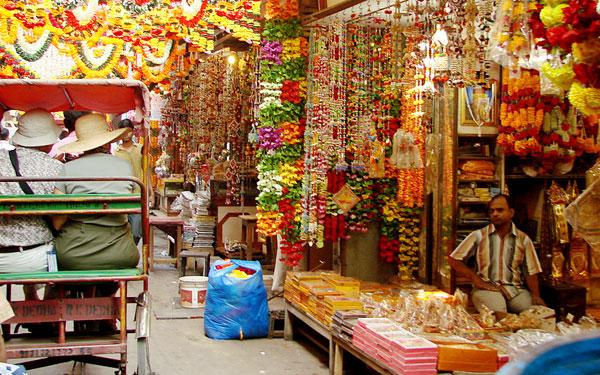Can Cheerless Diwali 2019 Be Lit Up?

Image Used for Representational Purpose Only
Biscuits, briefs, bikes and booze. For long, Indians have measured consumer sentiment on the barometer of how well (or not) these items are selling. So-called discretionary spending on such everyday items has been hitting new lows regularly, prompting the prediction that Diwali 2019 will be dull if not lifeless.
Traders, retailers and manufacturers at Delhi’s choc-a-bloc wholesale markets appear to be bogged down by bad memories of recent economic mismanagement rather than filled with hopes of a revival this festival season. They are still expressing bewilderment at the November 2016 decision of the central government to put Rs500 and Rs1000 notes out of circulation overnight. They are recollecting how their woes were compounded in 2017 when the government hastily implemented the Goods and Services Tax (GST).
Ever since, the government has repeatedly revised tax slabs and procedures for filing returns. Yet, these steps have failed to either raise revenues or satisfy the urgent needs of traders and the business community. To top it, consumer sentiment was never lower in recent times. All these factors have added up, creating a perfect storm of a decisive slump.
“There is no logic to the GST system. Gold is taxed at 3% while biscuits are taxed at 18%,” says Manoj Arneja, a prominent distributor of textiles and garments in the National Capital Region or NCR. Arneja reports a 50% fall in business in recent months. The causes are the same everywhere—the ripple effect of demonetisation and the faulty GST. “Diwali should have been a peak sales time for us but the situation this year is very bleak. Small and medium-sized businesses are badly hurt,” he says.
Or walk into Punjab Textiles on Tank Road in Karol Bagh, a clothing store owned by JH Arora. A litany of woes pours forth. Tank Road is the largest garment (jeans in particular) wholesale market in India but following the double whammy of demonetisation and GST has plunged to 25% of what it used to be.
“While the GST on items of clothing is 5%, on washing and dry-cleaning it is at 28%. Then we also have to pay different GST rates on job works handed to contractors, which works out to around 18%. Not only is this a complicated process but it has substantially raised production costs,” says Arora.
In the Dusshera-Diwali season, many Indians purchase new clothes that are meant to last a year but cloth merchants of Chandni Chowk are brimming with grievances instead of sales this year. They are filled with fear for smaller firms in particular, for they cannot compete with the online heavily-discounted festive sales. They say that online retailers import clothing from China and Vietnam, which have come to dominate the Indian textile market.
As the Indian economy continues its downward spiral, even in Delhi a large number of retail and wholesale traders are reporting falling sales. The festive season has not been able to fix this free-fall. In the large wholesale markets, Sadar Bazaar, Chandni Chowk and Karol Bagh, and in by-lanes dotted with hundreds of small and tiny retailers, there’s only news of slipping sales.
Economists blame the consumption slump on neo-liberal economic policies of the present government. Ravinder Goyal, a former professor of economics at Delhi University, says that the demand crisis can be overcome only if the government raises the purchasing power of the poor. “The Modi government’s neo-liberal model has failed. They hoped that a trickle-down effect would generate demand but it has only pauperised agriculture, raised unemployment and decreased industrial production; for there are no buyers whom manufacturers can sell products to,” he says.
Goyal suggests that the government should step in now and boost spending. “Unfortunately, even the government has no money and businessmen know where to keep their money—in their pocket. Therefore, this downturn will continue for some time,” Goyal says.
Mukul Gupta, a small grocery shop-owner in the heart of Chandni Chowk finds little to cheer about too. His complaint is that retailers are being steadily squeezed out of business by the big e-commerce players. “I just read that Amazon and Flipkart have done business worth Rs19,000 crore between 29 September and 4 October. How are we expected to compete with such mega-corporations? This is imperfect competition. They buy in bulk, be it butter, eggs, bread or edible oils at huge discounts. Our margins are 5 to 8%, so online prices are bound to beat ours,” he says.
This plaint is not rarely heard from members of the 12 crore-strong retailers across the country. Delhi, its neighbour Haryana, and Maharashtra (the richest state) are all facing the slowdown, but so are less-prosperous states.
A number of retailers spoken to in Delhi and the NCR rue that the government (the Ministry of Commerce and Industry and the official think-tank, Niti Aayog) has failed to take corrective measures. The traders have been demanding a cut in GST rates—just like the corporate tax rate was slashed 22%. The treasury took a Rs1.45 lakh crore hit for that tax break, so, the traders wonder, why not for them too. As Gupta says, “We voted for the BJP [Bharatiya Janata Party] believing that they would help small business but they did the opposite.”
“I would buy atta (wheat flour) and grains by the quintals (100s of kilos) at this time of the year. Now I purchase 25 kilo lentils from distributors and find it tough to sell. My income has slipped by three-fourths, and I had to fire three helpers,” Gupta laments.
Khari Baoli, the largest wholesale market for dry fruits in Asia, has an annual turnover of at least Rs500 crore. The traders here echo Arneja, the textiles distributor. Amrish Gulati, for instance. His long narrow store, typical of Khari Baoli, is an odd picture of desolation. lie His almond, walnut, pistachio, raisin and apricot supplies lie in large sacks in every nook and corner of his tiny shop. Yet, amidst the apparent opulence, comes the fact that they have not sold at even half of last year’s rate. “And this Diwali, people are buying dry fruit—which is usually bought this time of the year—in very small quantities,” Gulati says.
“I never saw the market so low. Khushi nazar nahi aati hai—customers do not look happy,” says Gulati, the third generation running this family operation. He breaks the depressed sentiment down to basics: Shoppers look unhappy because they are, basically, broke. “There’s no money in the market. Kaam dhandha bhi nahi hai—there is no business either.”
Not just Gulati and other sellers and importers of “fancy” items such as nuts and dried fruit. Sales executives across the spectrum of sectors and products have started saying that they are grappling with a lower shopper turnout. In markets that should have been buzzing with activity, the mood is sombre. They are hoping for the tide to turn during the Diwali week, but that could just be hoping against hope.
Even wholesale hubs everywhere in the country are missing customers. Sellers cannot seem to stop complaining about demonetisation and GST ripping through their volumes and profit margins. The slowdown set in just when the market was reeling under the blows struck in 2016 and 2017. The government then failed to address these strikes. The common man has no cash in hand and, this is why, some sellers report as much as a 60 to 75% fall.
But the malaise runs deeper than shoppers not showing up. Vikas Dandana, a plastic manufacturer, faces another kind of problem. He manufactures plastic utensils that are used at weddings and which are sold across the country. “I have not seen such a bleak situation in my life,” he says. In the past, if there was no demand in one state, the situation was always better another state, where he would find a willing buyer. “But in the last three years, the graph has only steadily declined,” he says.
Dandana pays a monthly electricity bill of around Rs3 lakh to run his factory. He needs to generate over Rs20 lakh sales a month to pay this, he says. “That is not happening—so, like many others in this line of business, my only option is to shut shop and sit at home,” he says.
Car and truck anciliary manufacturers, who are scattered around the NCR, are also despondent. “Our workshop at Sanjay Gandhi Transport Nagar, where we produced spare parts for trucks, had to be shut for trucks are no longer allowed into the Capital,” says Arun Verma, a manufacturer. While hundreds like him, Verma says, are close to going bankrupt, the Ministry of Finance has not given them a bail-out package. “They gave a Rs1.45 lakh crore tax waiver to large industrialists but nothing to support small businessmen. Do we not need some support too,” Verma says.
Portend of serious crisis for workers
NCR-based Vinay Kapoor, who runs a large trucking operation, says, “Demonetisation was supposed to help the government curb corruption, but it has only increased. A truck may have an all-India permit, still we have to pay separate taxes each time we enter a state. Every Regional Transport Office has their own ‘rate’ for under-the-table payments.”
Over the last few months, several truckers have shut down and migrated to Canada. “They lost hope in India and opted out—but is that really a solution,’ Kapoor asks.
Asha Kapoor, a former professor at the Indian Institute of Public Administration and consultant with international agencies believes the government must create work opportunities. “That is critical and it can be done at multiple levels. In villages, just implementing the MG-NREGA with 100 days of guaranteed work will kickstart the rural economy,” she says.
Falling profits, rising stock and waning spending create a downward spiral on which apprehensions about the future mount. There is no immediate escape from this as signs of trouble pile up. Everything suggests that this slowdown will be deep.
Rashme Sehgal is a freelance journalist in Delhi. Views are personal.
Get the latest reports & analysis with people's perspective on Protests, movements & deep analytical videos, discussions of the current affairs in your Telegram app. Subscribe to NewsClick's Telegram channel & get Real-Time updates on stories, as they get published on our website.
























